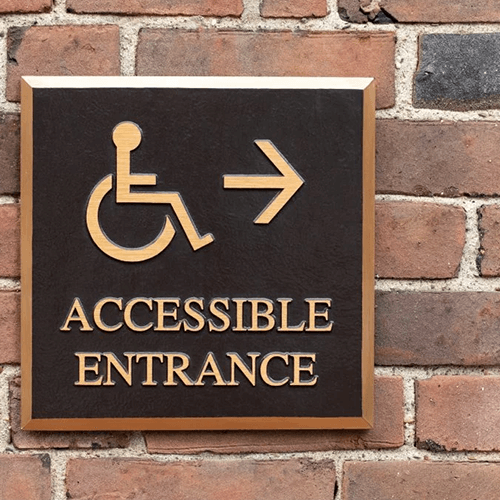
It's in the best interests of every business to ensure that they run as efficiently as possible. That includes following all federal and state regulations protecting civil rights. With that in mind, complying with the Americans with Disabilities Act is crucial to the success of your business.
Take the extra steps to prevent yourself from becoming the victim of misinformation. Educate yourself by learning some common misconceptions about accessibility compliance for commercial doors.
President George H.W. Bush signed the Americans with Disabilities Act (ADA) into law on July 26, 1990 to protect civil rights. The act created standards for making facilities more accessible. Every business owner operating within the United States must comply with this legislation's guidelines.
Not every door in a place of public accommodation must meet accessibility requirements. However, at least 60% of a building’s entrances must allow people with limited mobility to enter the property. At least one door should be accessible in these areas of your facility:
For a doorway to be accessible, it must measure at least 80 inches tall and at least 32 inches wide.
Even though it has been around for over 30 years, there are several misconceptions about accessibility compliance for commercial doors.
You don't necessarily have to invest in significant renovations to get your commercial doors in compliance. The law requires you to remove any barriers that could prevent an individual in a wheelchair, or someone with another disability, from entering your building.
The act states that accommodations should be made "without much difficulty or expense," meaning you won't need to break the bank on construction costs to make your commercial doors accessible.
The ADA does not include grandfathering provisions. No matter how old your building is or its historical relevance, you must provide adequate doors for your guests.
If your building was built or remodeled before January 26, 1992, the ADA dictates you remove any barriers at the time of construction. The only exceptions were cosmetic, like changing the paint or carpeting.
Even if your building has not undergone significant renovations, the ADA requires that all public facilities offer disabled Americans access to goods and services.
Commercial businesses must periodically evaluate their building to determine whether any barriers exist that should be removed and create a plan to remove them.
Even with proper permits, it is common for ADA violations to occur. Identifying violations is often challenging because they can have many different causes. They may occur for the following reasons:
It's crucial to verify that your commercial doors comply with the ADA.
If public members have access to your building for goods and services, your business is open to the public. However, you have to consider what is classified as open to the public. Never assume your building is exempt; it's best to consult a professional. Otherwise, you're putting yourself at risk of violating the terms of the ADA.
The ADA guidelines don't apply to just physical property. They also apply to any entity conducting business within the property. Tenants must remember that the landlord is not responsible for whether an individual company complies with the regulations.
Furthermore, anyone can file an ADA lawsuit against the respective business owner and the property owner.
If you rent an office space, it's advisable to have an agreement between you and the landlord indicating who is responsible for ensuring all doors are ADA accessible.
CDF Distributors supplies commercial doors to companies across the United States. Trust us to keep your business accessible to those with disabilities.
August 3, 2022
Wayne Foreman